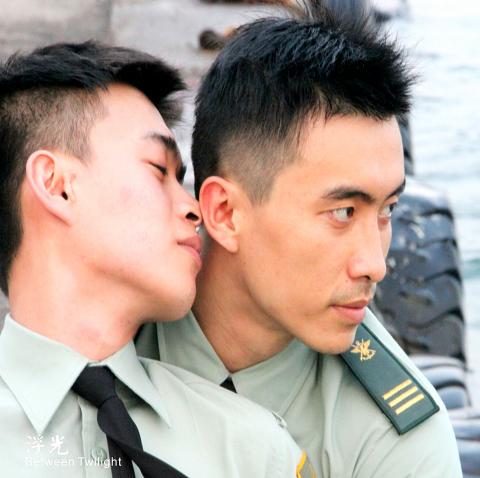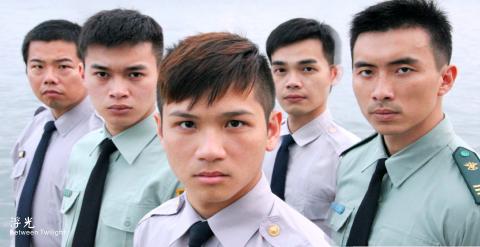Sexual infidelity, metaphysical musings on death and ghostly goings-on meet in Taiwan avant-garde troupe Firefly Theatre’s (螢火蟲劇團) Between Twilight (浮光), which premiered to widespread acclaim in 2002 and is being revived next month with performances on June 15 and June 16 at the Taipei City Shuiyuan Theater (台北市水源劇場) and on June 22 and June 23 at the Kaohsiung Cultural Center’s Chihteh Hall (高雄市立文化中心至德堂).
In the play, a police officer’s ghost commits suicide every night in Keelung. The precinct police chief’s mistress, a medium, attempts to contact the spirit and unwittingly unearths a tangled web of homosexual and heterosexual love, police corruption and money laundering in the process. The production features Ronnie Oscar Tung (董浚凱) as the police chief, Hannes Zhou (周楓傑) as the ghost, Taiwanese opera actress Chen Xi-han (陳思涵) as the mistress, and the troupe’s artistic director Han Jiang (韓江) as a reckless gambler.
“Audiences enjoyed the 2002 production, but at that time my mother was dying, so all my senses were shutting down,” director Han told the Taipei Times. “This revival feels like a brand-new story because I feel more alive now.”

Photo courtesy of Firefly Theatre
Despite the play’s seemingly fantastical plot, it was inspired by Han’s life story. Before creating Firefly Theatre in 1995, he grew up in a military village in Kaohsiung and served as a local police officer for eight years in Keelung. That experience allowed him to cultivate relationships with marginalized characters, such as an entry-level police officer, a sex worker and drug user.
“All the characters, except for the dead officer, in this story are still alive,” Han said. “I decided to keep the denouement open-ended to show my respect.”
In the play, Han bravely tackles taboo subjects, such as the sex trade, drugs and death. “I started seeing ghosts in junior high school,” Han said. “I have learned to live with it. It gives me a different perspective on what life means and what death leads to.”

Photo courtesy of Firefly Theatre
Han’s exploration of the process of dying and the end of life is far from over. A devout Buddhist, Han’s upcoming work, titled Deep Fall (秋夜), which will be staged this winter, contemplates life and was inspired by a trip that Han made to India.
Because of its subject matter, Between Twilight is restricted to adults aged 18 and over. The show will be performed in a mixture of Mandarin and Hoklo [commonly known as Taiwanese], but there won’t be any subtitles.

In the March 9 edition of the Taipei Times a piece by Ninon Godefroy ran with the headine “The quiet, gentle rhythm of Taiwan.” It started with the line “Taiwan is a small, humble place. There is no Eiffel Tower, no pyramids — no singular attraction that draws the world’s attention.” I laughed out loud at that. This was out of no disrespect for the author or the piece, which made some interesting analogies and good points about how both Din Tai Fung’s and Taiwan Semiconductor Manufacturing Co’s (TSMC, 台積電) meticulous attention to detail and quality are not quite up to

April 21 to April 27 Hsieh Er’s (謝娥) political fortunes were rising fast after she got out of jail and joined the Chinese Nationalist Party (KMT) in December 1945. Not only did she hold key positions in various committees, she was elected the only woman on the Taipei City Council and headed to Nanjing in 1946 as the sole Taiwanese female representative to the National Constituent Assembly. With the support of first lady Soong May-ling (宋美齡), she started the Taipei Women’s Association and Taiwan Provincial Women’s Association, where she

Chinese Nationalist Party (KMT) Chairman Eric Chu (朱立倫) hatched a bold plan to charge forward and seize the initiative when he held a protest in front of the Taipei City Prosecutors’ Office. Though risky, because illegal, its success would help tackle at least six problems facing both himself and the KMT. What he did not see coming was Taipei Mayor Chiang Wan-an (將萬安) tripping him up out of the gate. In spite of Chu being the most consequential and successful KMT chairman since the early 2010s — arguably saving the party from financial ruin and restoring its electoral viability —

It is one of the more remarkable facts of Taiwan history that it was never occupied or claimed by any of the numerous kingdoms of southern China — Han or otherwise — that lay just across the water from it. None of their brilliant ministers ever discovered that Taiwan was a “core interest” of the state whose annexation was “inevitable.” As Paul Kua notes in an excellent monograph laying out how the Portuguese gave Taiwan the name “Formosa,” the first Europeans to express an interest in occupying Taiwan were the Spanish. Tonio Andrade in his seminal work, How Taiwan Became Chinese,